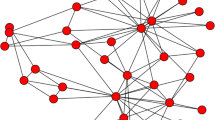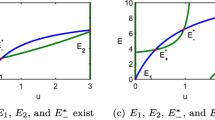Abstract
The problem of cooperation among selfish nodes in ad hoc networks has gained recently a considerable attention. In this paper we propose a dynamic game theoretical model of cooperation in ad hoc networks, based on evolutionary game theory. Our model enables us to make predictions about possible equilibrium points of the network composed of the selfish and learning nodes, which can dynamically adjust their strategy in order to maximize their own payoff. In particular, we show that if an ad hoc network implements a reputation mechanism, all long term equilibrium points of the system will include cooperating nodes. In fact, in most of the equilibrium points, the cooperators will constitute a majority of the nodes. We believe that this new approach, borrowing from biological research, can have broader applications for studying dynamics of distributed communication systems.
Similar content being viewed by others
References
S. Buchegger and J.-Y.L. Boudec, Performance analysis of the CONFIDANT protocol (Cooperation of nodes: Fairness in dynamic ad-hoc networks), in: Proc. of MOBIHOC'02, EPFL, Lausanne, Switzerland (2002).
L. Buttyán and J.-P. Hubaux, Nuglets: A virtual currency to stimulate cooperation in self-organized mobile ad hoc networks, Technical Report DSC/2001/001, Institute for Computer Communications and Applications, Department of Communication Systems, Swiss Federal Institute of Technology (2001).
L. Buttyán and J.-P. Hubaux, Stimulating cooperation in self-organizing mobile ad hoc networks, ACM/Kluwer Mobile Networks and Applications 8(5) (2003).
D. Fudenberg and J. Tirole, Game Theory (MIT Press, Cambridge, MA, 1991).
H. Gintis, Game Theory Evolving (Princeton Univ. Press, Princeton, NJ, 2000).
J. Hofbauer and K. Sigmund, Evolutionary Games and Population Dynamics (Cambridge Univ. Press, Cambridge, MA, 1998).
P. Kollock, Social dilemmas: The anatomy of cooperation, Annual Review of Sociology 24 (1998) 183–214.
S. Marti, T.J. Giuli, K. Lai and M. Baker, Mitigating routing misbehavior in mobile ad hoc networks, in: Mobile Computing and Networking (2000) pp. 255–265.
P. Michiardi and R. Molva, A game theoretical approach to evaluate cooperation enforcement mechanisms in mobile ad hoc networks, in: Proc. of the Workshop on Modeling and Optimization in Mobile, Ad Hoc and Wireless Networks, INRIA, Sophia-Antipolis, France (2003).
E. Ostrom, R. Gardner and J. Walker, Rules, Games, and Common-Pool Resources (Univ. of Michigan Press, 1994).
L. Perko, Differential Equations and Dynamical Systems, Texts in Applied Mathematics, Vol. 7 (Springer, New York, 2002).
P. Resnick, R. Zeckhauser, E. Friedman and K. Kuwabara, Reputation Systems: Facilitating trust on the Internet, Communications of the ACM 43(12) (2000) 45–48; available online at: http://www. orie.cornell.edu/~friedman/pfiles/communications7.doc.
L. Samuelson, Evolutionary Games and Equilibrium Selection, MIT Press Series on Economic Learning and Social Evolution, Vol. 1 (MIT Press, Cambridge, MA, 1998).
A. Urpi, M. Bonuccelli and S. Giordano, Modelling cooperation in mobile ad hoc networks: A formal description of selfishness, in: Proc. of the Workshop on Modeling and Optimization in Mobile, Ad Hoc and Wireless Networks, INRIA, Sophia-Antipolis, France (2003).
J. Weibull, Evolutionary Game Theory (MIT Press, Cambridge, MA, 1997).
K. Wrona and P. Mähönen, Cooperative and cognitive networks with reputation and trust, China Telecommunications Journal (2004) in press.
K. Wrona and P. Mähönen, Investigation and visualization of dynamics of cooperation and trust in distributed communication systems, in: Proc. of the 1st IEEE/IFIP Internat. Conf. on Wireless and Optical Communications Networks (WOCN), Muscat, Oman (2004).
Author information
Authors and Affiliations
Rights and permissions
About this article
Cite this article
Wrona, K., Mähönen, P. Analytical Model of Cooperation in Ad Hoc Networks. Telecommunication Systems 27, 347–369 (2004). https://doi.org/10.1023/B:TELS.0000041015.43191.40
Issue Date:
DOI: https://doi.org/10.1023/B:TELS.0000041015.43191.40




